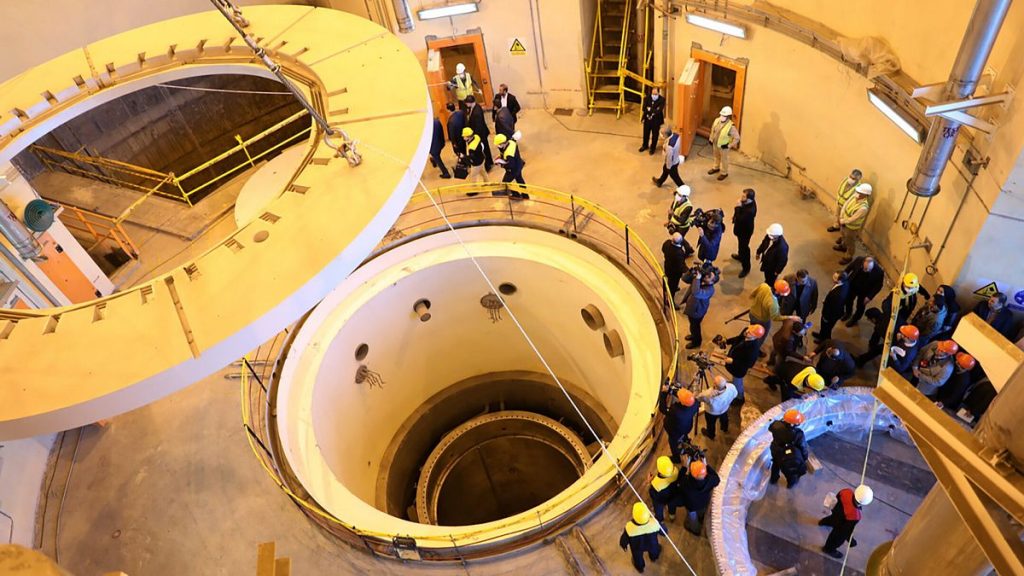Iran is actively pursuing support from Russia to bolster negotiations with the United States regarding its advancing nuclear program. This comes ahead of a second round of talks scheduled for this weekend in Rome. Iran’s Foreign Minister, Abbas Araghchi, has been in direct communication with Russian officials, emphasizing the importance of Russia’s role in the ongoing discussions and the broader implications for international security.
| Article Subheadings |
|---|
| 1) Iran Seeks Russian Support for Nuclear Talks |
| 2) Diplomatic Efforts and the Role of Russia |
| 3) U.S. Response and Concerns Over Iran’s Nuclear Capabilities |
| 4) The Context of the 2015 Nuclear Deal |
| 5) Summary of Current Developments and Future Implications |
Iran Seeks Russian Support for Nuclear Talks
In an effort to revive discussions on its nuclear program, Iran’s Foreign Minister, Abbas Araghchi, has reached out to Russia for assistance. This dialogue was initiated following a recent round of talks held in Oman, which laid the groundwork for further negotiations set to take place in Rome. The Iranian government is optimistic about Russia’s involvement, considering it crucial for securing a prospective deal with the U.S. Araghchi’s praise of Moscow’s previous collaboration in the 2015 nuclear agreement highlights Iran’s reliance on Russia as a strategic ally in navigating complex diplomatic waters.
Diplomatic Efforts and the Role of Russia
In a joint press conference with Russian Foreign Minister Sergey Lavrov, Araghchi lauded Russia’s supportive role in the historic 2015 nuclear deal which facilitated the lifting of sanctions against Iran in exchange for its commitment to limit nuclear activities. During the talks, Lavrov reiterated Russia’s readiness to mediate and assist in further nuclear discussions, stating, “
We are ready to help, mediate and play any role that, from Iran’s point of view, will be useful and that will be acceptable to the United States.
” This proactive posture from Russia indicates a significant interest in stabilizing its relations with both Iran and the West, potentially positioning Moscow as a key intermediary in the ongoing dialogue.
U.S. Response and Concerns Over Iran’s Nuclear Capabilities
The United States government, represented by Secretary of State Marco Rubio, has voiced skepticism over the feasibility of the negotiations. Rubio emphasized the importance of maintaining sanctions against Iran as leverage. During talks in Paris with European allies, including British, French, and German officials, Rubio highlighted the gravity of Iran’s nuclear advancements, remarking that the country is “dangerously close to a weapon” due to its escalation of uranium enrichment levels, currently reaching up to 60%. In light of these developments, there are heightened concerns regarding Iran’s compliance with international nuclear agreements, as officials brace for an upcoming report from the International Atomic Energy Agency (IAEA) that may detail further non-compliance.
The Context of the 2015 Nuclear Deal
The backdrop to these discussions is the landmark 2015 nuclear deal, formally known as the Joint Comprehensive Plan of Action (JCPOA), which was designed to curb Iran’s nuclear ambitions in exchange for sanctions relief. The agreement was upended in 2018 when former President Trump’s unilateral withdrawal and subsequent re-imposition of sanctions prompted Iran to abandon its commitments under the pact. Since then, Iran has ramped up its nuclear program, enriching uranium much closer to weapons-grade levels, which has introduced new complexities in international relations and raised alarms among global powers.
Summary of Current Developments and Future Implications
As Iran prepares for its subsequent round of nuclear talks in Rome, the involvement of Russia adds a critical dynamic to the equation. Tehran’s outreach for support is a strategic maneuver aimed at fortifying its negotiating position against U.S. sanctions. With the stakes climbing, the international community is watching closely to gauge whether these discussions will yield a constructive pathway toward a renewed agreement or if they will further entrench existing tensions. The situation remains fluid and full of potential implications for regional and global security.
| No. | Key Points |
|---|---|
| 1 | Iran is seeking support from Russia to enhance diplomatic negotiations with the U.S. over its nuclear program. |
| 2 | Foreign Minister Abbas Araghchi praised Russia’s role in the 2015 nuclear deal and hopes for continued support. |
| 3 | The U.S. government has expressed concerns regarding Iran’s advances toward developing nuclear weapons. |
| 4 | The 2015 nuclear deal’s collapse has raised tensions and led to Iran enriching uranium to near weapons-grade levels. |
| 5 | Ongoing negotiations could significantly impact regional security and international relations moving forward. |
Summary
The ongoing dialogue between Iran and the United States, facilitated by Russian support, emphasizes the intricate nature of international diplomacy surrounding nuclear proliferation. As Iran seeks to stabilize its position following the tumultuous fallout from the 2015 nuclear accord, the implications of these discussions will undoubtedly resonate across global security frameworks. It will be critical to monitor how these negotiations evolve, as they hold the potential to either alleviate tensions or escalate conflicts further.
Frequently Asked Questions
Question: What is the significance of the 2015 nuclear deal?
The 2015 nuclear deal, known as the Joint Comprehensive Plan of Action (JCPOA), was a critical agreement aimed at limiting Iran’s nuclear capabilities in exchange for the lifting of international sanctions. Its collapse has led to increased tensions and escalated military concerns about Iran’s pursuit of nuclear weapons.
Question: How is Russia involved in the current negotiations?
Russia is playing a supportive role in the ongoing negotiations between Iran and the United States, offering to mediate discussions and help facilitate a deal. This stems from a historic alliance and shared interests in maintaining regional stability.
Question: What are the implications of increased uranium enrichment by Iran?
Iran’s increase in uranium enrichment raises alarms regarding its potential to develop nuclear weapons. Enriching uranium to levels close to weapons-grade poses a significant threat to global security and complicates international diplomatic efforts.
